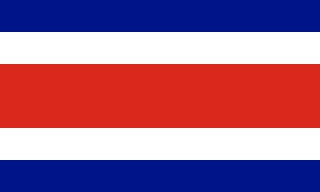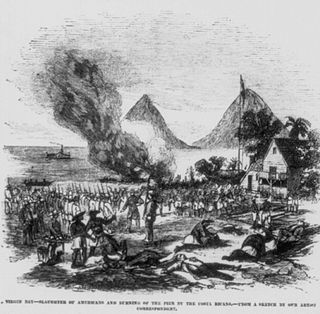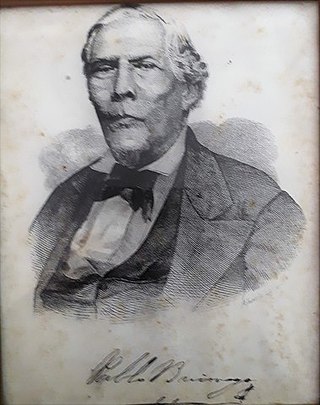
Costa Rica, officially the Republic of Costa Rica, is a country in the Central American region of North America. It borders Nicaragua to the north, the Caribbean Sea to the northeast, Panama to the southeast, and the Pacific Ocean to the southwest, as well as maritime border with Ecuador to the south of Cocos Island. It has a population of around five million in a land area of nearly 51,180 km2 (19,760 sq mi). An estimated 352,381 people live in the capital and largest city, San José, with around two million people in the surrounding metropolitan area.

Ramón Bernardo Soto Alfaro was the Olympus President of Costa Rica from 1885 to 1889 during the Liberal State.

José Bruno Carranza Ramírez was briefly President of Costa Rica in 1870. Bruno Carranza came to power in the coup d'état of 27 April 1870 that deposed President Jesús Jiménez. He resigned three months later.

Costa Rican culture has been heavily influenced by Spanish culture ever since the Spanish colonization of the Americas including the territory which today forms Costa Rica. Parts of the country have other strong cultural influences, including the Caribbean province of Limón and the Cordillera de Talamanca which are influenced by Jamaican immigrants and indigenous native people, respectively.

The Filibuster War or Walker affair was a military conflict between filibustering multinational troops stationed in Nicaragua and a coalition of Central American armies. An American mercenary, William Walker, and his small private army were invited to Nicaragua in 1855. He seized control of the country by 1856, but was ousted the following year.

The Costa Rican Civil War took place from 12 March to 24 April 1948. The conflict followed the presidential elections of 8 February 1948, in which opposition candidate Otilio Ulate defeated the ruling party's Rafael Ángel Calderón Guardia. The pro-government representatives who dominated the Legislative Assembly alleged that Ulate's victory was fraudulent, and on 1 March, the legislature voted to annul the results of the election. This triggered an armed uprising led by José Figueres Ferrer, a businessman who had not participated in the elections, against the government of President Teodoro Picado.
Territorial disputes of Nicaragua include the territorial dispute with Colombia over the Archipelago of San Andrés, Providencia and Santa Catalina and Quita Sueño Bank. Nicaragua also has a maritime boundary dispute with Honduras in the Caribbean Sea and a boundary dispute over the Rio San Juan with Costa Rica.

José Antonio Lacayo de Briones y Palacios (1679–1756) was a Spanish "intendant" or "intendente" who held the position of governor in two countries in Central America during the Spanish colonial period. He was Governor of Costa Rica from 1713 to 1717 and Governor of Nicaragua from 1740 to 1745. He also held the post of Commander in Chief of the Army and strengthened the defenses of these two countries against foreign invasion.

José María Cañas Escamilla was a Salvadoran military figure. He was born in Suchitoto, El Salvador.
Joaquín Bernardo Calvo Rosales (1799–1865) was a Costa Rican politician, born in Cartago, Costa Rica, Viceroyalty of New Spain in 1799. His first wife was Juana Vicenta Fernandez y Quirós and he remarried to Salvadora Mora y Perez.

Ezequiel Gutiérrez Iglesias was a Costa Rican politician.

Manuel María de Peralta y Alfaro was a Costa Rican diplomat and historian. De Peralta y Alfaro was born in Taras, Cartago, Costa Rica, on July 4, 1847. He was the only Costa Rican to ever be given the designation of "Hero of the Motherland" twice.

Nazario Toledo was a Costa Rican politician.

Pablo Sánchez de Buitrago Sandoval y Benavente was a legitimist Nicaraguan politician who served as the 2nd Supreme Director of Nicaragua from 4 March 1841 to 1 April 1843. He was the first non-acting, elected Supreme Director.
The Cañas–Jerez Treaty between Costa Rica and Nicaragua was enacted April 15, 1858 as a solution to the growing border tension between the two countries. The treaty was negotiated between Máximo Jerez representing Nicaragua and José María Cañas representing Costa Rica. It established a border between the two countries that skirts the southern edge of Lake Nicaragua, then moves east along the San Juan River for the last third of the division, following it north from where it forks from the Rio Colorado. The treaty puts the border on the right bank of the river, giving the river to Nicaragua, but provides commercial navigation rights to Costa Rica.

José María Alfaro Zamora was the Costa Rican Head of State between the periods of 1842 and 1844 as well as 1846 and 1847 and President of Costa Rica between May 1 and May 8, 1847.

Francisco María Oreamuno Bonilla was a Costa Rican politician and the Head of State of Costa Rica from November to December 1844.

The Nicaragua–Costa Rica San Juan River border dispute was a series of periodical conflicts between Costa Rica and Nicaragua over the correct delimitation of their common border at its east-end, and the interpretation of the navigation rights on the San Juan River established in the Cañas-Jerez Treaty of 1858.

The nations of Costa Rica and Mexico established diplomatic relations 1838. Both nations are members of the Association of Caribbean States, Community of Latin American and Caribbean States, Organization of American States, Organization of Ibero-American States and the United Nations.
Carmen Muñoz is a Costa Rican politician and activist. She is the Vice-Minister Of Government and Police named by president Luis Guillermo Solís and commissioned to separate and turn it into an independent ministry of the Ministry of Public Security. She was a congresswoman in the Legislative Assembly of Costa Rica where she headed the Citizen Action Party. To date Muñoz is the only out lesbian in parliament or in charge of a ministry.















